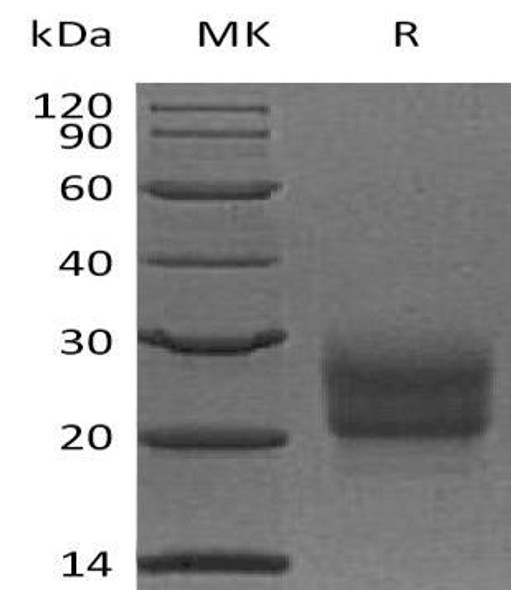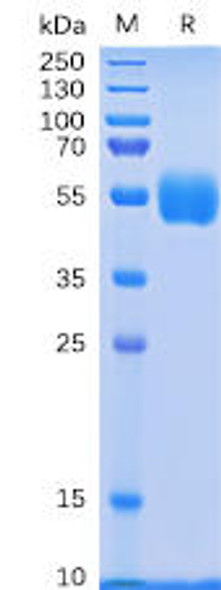Description
| Product Name: | Human NKp30/NCR3 Recombinant Protein (His tag) |
| Product Code: | RPES6059 |
| Size: | 20µg |
| Species: | Human |
| Expression Host: | HEK293 Cells |
| Synonyms: | Natural Cytotoxicity Triggering Receptor 3, Activating Natural Killer Receptor p30, Natural Killer Cell p30-Related Protein, NK-p30, NKp30, CD337, NCR3, 1C7, LY117, 1C7, DAAP-90L16.3, MALS |
| Mol Mass: | 14.74 kDa |
| AP Mol Mass: | 25 kDa |
| Tag: | C-His |
| Purity: | > 95 % as determined by reducing SDS-PAGE. |
| Endotoxin Level: | Please contact us for more information. |
| Bio Activity: | Testing in progress |
| Sequence: | Met1-Gly135 |
| Accession: | O14931 |
| Storage: | Generally, lyophilized proteins are stable for up to 12 months when stored at -20 to -80°C. Reconstituted protein solution can be stored at 4-8°C for 2-7 days. Aliquots of reconstituted samples are stable at < -20°C for 3 months. |
| Shipping: | This product is provided as lyophilized powder which is shipped with ice packs. |
| Formulation: | Lyophilized from sterile PBS, pH 7.4. Normally 5 % - 8 % trehalose, mannitol and 0.01% Tween80 are added as protectants before lyophilization. Please refer to the specific buffer information in the printed manual. |
| Reconstitution: | Please refer to the printed manual for detailed information. |
| Background: | Natural Cytotoxicity Triggering Receptor 3; NCR3; also known as NKp30; or CD337; is a natural cytotoxicity receptor; expressed on subsets of human peripheral blood NK cells; involved in NK cell killing of tumor cells and immature dendritic cells. The cellular ligand for NKp30 has remained elusive; but the membrane-associated heparan sulfate (HS) proteoglycans are involved in the recognition of cellular targets by NKp30 was recently reported. NKp30 is a member of the immunoglobulin superfamily and one of three existing natural cytotoxicity-triggering receptors. NKp30 is a glycosylated protein and is thought to be selectively expressed in resting and activated natural killer cells. NKp30 is a stimulatory receptor on human NK cells implicated in tumor immunity; and is capable of promoting or terminating dendritic cell maturation. NCR3 may play a role in inflammatory and infectious diseases. |






